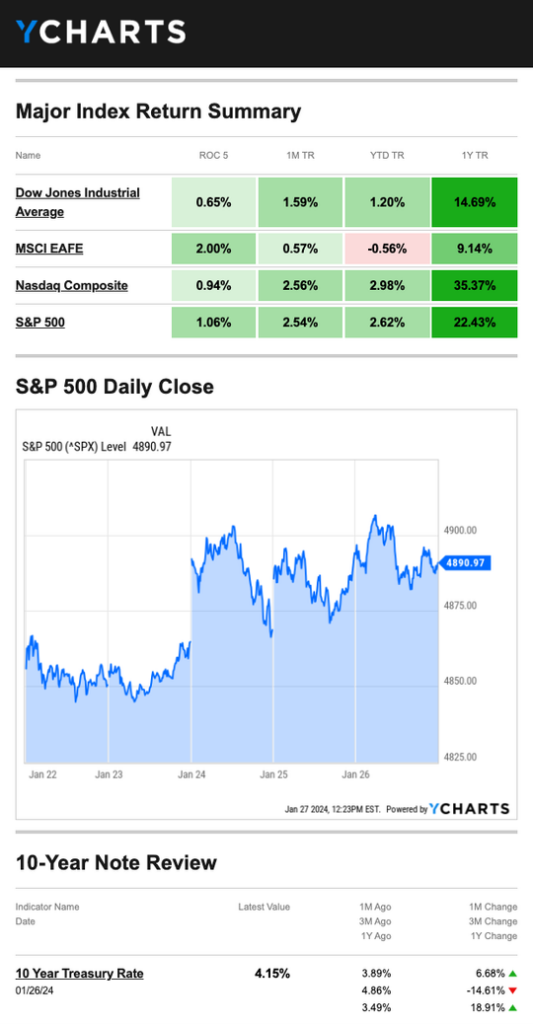Stocks continued their upward climb last week as excitement around big tech continued; positive economic reports stoked investors’ belief that the Federal Reserve has pulled off a soft landing.
Stocks Power Ahead
Big tech was back last week, pushing the Dow and the S&P 500 to new highs early in the week as markets resumed the late Q4 rally.
The so-called “Magnificent Seven” stocks—comprising 28% of the S&P 500 Index—resumed their pole position at the head of the pack as investors maintained their artificial intelligence (AI)-related bullishness and rewarded widespread cost-cutting at many tech giants. While the rally fizzled on Friday, the week’s gains were slow but steady.1,2,3
The big economic news last week was better-than-expected economic growth and inflation news. Real Gross Domestic Product grew at a 3.3% annualized clip in Q4 2023, ahead of Wall Street consensus expectations of 2%.
The Personal Consumption Expenditures (PCE) Index, one of the Fed’s most favored inflation gauges, showed core inflation (excluding food and energy) cooled in December, with an annualized rate of 2.9%, beating consensus expectations. Core inflation was 3.2% on an annualized basis—its lowest level since March 2021. While the inflation update didn’t move markets much, it helped validate investors’ optimism that Fed policy has maintained economic growth while bringing inflation down.4

| Source: YCharts.com, January 27, 2024. Weekly performance is measured from Monday, January 22, to Friday, January 26. ROC 5 = the rate of change in the index for the previous 5 trading days. TR = total return for the index, which includes any dividends as well as any other cash distributions during the period. Treasury note yield is expressed in basis points. |
Earnings Season Feeds FOMO
The market digested Q4 earnings news from some of the largest companies, with enthusiasm feeling like FOMO. The “fear of missing out” drove much investor sentiment and seemed to build market momentum.
While the enthusiasm for AI continues to be one driver of technology stock prices, the spotlight last week was on layoffs. Over 23,000 workers at 85 tech companies have lost their jobs this month. The market appears to be rewarding the cost-cutting measures, with many tech giants repositioning themselves with AI in mind, and some analysts inferring that this emphasis on efficiency may encourage investors.5,6
This Week: Key Economic Data
Tuesday: FOMC Meeting. Consumer Confidence. Home Price Index.
Wednesday: FOMC Announcement/Fed Chair Press Conference.
Thursday: Jobless Claims. ISM Manufacturing Index. Fed Balance Sheet.
Friday: Employment Situation.
Source: Investors Business Daily – Econoday economic calendar; January 26, 2024
The Econoday economic calendar lists upcoming U.S. economic data releases (including key economic indicators), Federal Reserve policy meetings, and speaking engagements of Federal Reserve officials. The content is developed from sources believed to be providing accurate information. The forecasts or forward-looking statements are based on assumptions and may not materialize. The forecasts also are subject to revision.
This Week: Companies Reporting Earnings
Tuesday: Microsoft Corporation (MSFT), Alphabet Inc. (GOOG, GOOGL), United Parcel Service, Inc. (UPS), Starbucks Corporation (SBUX)
Wednesday: Mastercard Incorporated (MA), The Boeing Company (BA), Automatic Data Processing, Inc. (ADP)
Thursday: Apple Inc. (AAPL), Amazon.com, Inc. (AMZN), Meta Platforms, Inc. (META), Merck & Co., Inc. (MRK)
Friday: Exxon Mobil Corporation (XOM), Bristol Myers Squibb Company (BMY)
Source: Zacks, January 26, 2024
Companies mentioned are for informational purposes only. It should not be considered a solicitation for the purchase or sale of the securities. Investing involves risks, and investment decisions should be based on your own goals, time horizon, and tolerance for risk. The return and principal value of investments will fluctuate as market conditions change. When sold, investments may be worth more or less than their original cost. Companies may reschedule when they report earnings without notice.
1. The Wall Street Journal, January 22, 2024
2. CNBC.com, January 22, 2024
3. The Wall Street Journal, January 25, 2024
4. CNBC.com, January 25, 2024
5. Slickcharts.com, January 26, 2024
6. CNBC.com, January 26, 2024
7. IRS.gov, July 27, 2023
8. Healthline.com, October 9, 2023
Investing involves risks, and investment decisions should be based on your own goals, time horizon, and tolerance for risk. The return and principal value of investments will fluctuate as market conditions change. When sold, investments may be worth more or less than their original cost.
The forecasts or forward-looking statements are based on assumptions, may not materialize, and are subject to revision without notice.
The market indexes discussed are unmanaged, and generally, considered representative of their respective markets. Index performance is not indicative of the past performance of a particular investment. Indexes do not incur management fees, costs, and expenses. Individuals cannot directly invest in unmanaged indexes. Past performance does not guarantee future results.
The Dow Jones Industrial Average is an unmanaged index that is generally considered representative of large-capitalization companies on the U.S. stock market. Nasdaq Composite is an index of the common stocks and similar securities listed on the NASDAQ stock market and is considered a broad indicator of the performance of technology and growth companies. The MSCI EAFE Index was created by Morgan Stanley Capital International (MSCI) and serves as a benchmark of the performance of major international equity markets, as represented by 21 major MSCI indexes from Europe, Australia, and Southeast Asia. The S&P 500 Composite Index is an unmanaged group of securities that are considered to be representative of the stock market in general.
U.S. Treasury Notes are guaranteed by the federal government as to the timely payment of principal and interest. However, if you sell a Treasury Note prior to maturity, it may be worth more or less than the original price paid. Fixed income investments are subject to various risks including changes in interest rates, credit quality, inflation risk, market valuations, prepayments, corporate events, tax ramifications and other factors.
International investments carry additional risks, which include differences in financial reporting standards, currency exchange rates, political risks unique to a specific country, foreign taxes and regulations, and the potential for illiquid markets. These factors may result in greater share price volatility.
Please consult your financial professional for additional information.
This content is developed from sources believed to be providing accurate information. The information in this material is not intended as tax or legal advice. Please consult legal or tax professionals for specific information regarding your individual situation. This material was developed and produced by FMG Suite to provide information on a topic that may be of interest. FMG is not affiliated with the named representative, financial professional, Registered Investment Advisor, Broker-Dealer, nor state- or SEC-registered investment advisory firm. The opinions expressed and material provided are for general information, and they should not be considered a solicitation for the purchase or sale of any security.
Copyright 2024 FMG Suite.


